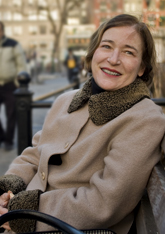In this ongoing series, Critical Mass asks writers and critics what they're reading. Here's what 2009 Balakian award recipient Joan Acocella had to say.
 The three books I’ve read in the last month for pleasure, not for work, are
The three books I’ve read in the last month for pleasure, not for work, are
Philip Pullman, The Good Man Jesus and the Scoundrel Christ (2010), in which Mary has twins, and one of them, the Scoundrel Christ, arranges for the other to die, as he must in order for the Church to be founded. Pullman was influenced, I think, by the Grand Inquisitor scene in The Brothers Karamazov and also, more so, by the recently unearthed gospels—e.g., the Gospel of Judas—that didn’t make it into the Canon. But you don’t have to know that background in order to like this wonderful, short, creepy book. The Roman Catholic Church dislikes Pullman. I can see why.
Naguib Mahfouz, Palace Walk (1956). I had never read an Egyptian novel before. This is set in Cairo during World War I and the independence movement that followed it. (The independence rallies figure in the book’s sad ending.) It is a conservative narrative, based, I assume, on European novels of the 19c, with their family portraits and their marriage plots. What is so interesting here is, first, the picture of how middle-class Muslims lived in the early 20c (the religiosity; the position of the women) and, second, the wonderfully nuanced psychology, like something out of George Eliot. A lot of the dialogue, actually, is very stilted. This must be, to some extent, the translators’ fault, but I am told that Arabic literature in the early 20c was imprisoned in a lot of floweriness. Mahfouz won the Nobel Prize in 1988.
Akhil Sharma, An Obedient Father (2000). This first novel concerns a petty official in New Delhi who forces his twelve-year-old daughter into a sexual relationship with him. The remembered sex scenes and the repercussions (the book takes place maybe twenty years after the period of the incest) are appalling. At the same time, a lot of the book is funny, especially the parts about the rampant corruption in New Delhi officialdom. This taking on of child abuse, the most deplored of crimes, and mixing it with comedy and/or tragedy (by the end, the father is more sympathetic than the daughter), was absolutely shocking when Nabokov did it in Lolita in 1955. Now it is more common (e.g., Todd Solondz’s Happiness). It is still disturbing and, as in Nabokov, very interesting.
In October I am going to Rome for a two-week vacation. There I should probably be reading Roman novels, but I will be reading Indian novels, or novels by Indians who now live in the West. I don’t know any Indian languages, but most of the novels were written in English. I am going about this responsibly, sort of. I try to read the books chronologically. I take notes. I’d like to write something about Indian fiction some day.
Joan Acocella received the 2009 NBCC Nona Balakian Citation for Excellence in Reviewing. She is the dance critic for The New Yorker and also contributes to The New York Review of Books. She has written several books on dance, literature, and psychology, including Creating Hysteria, Mark Morris, and Willa Cather and the Politics of Criticism. Her most recent book is Twenty-Eight Artists and Two Saints, a collection of essays.


